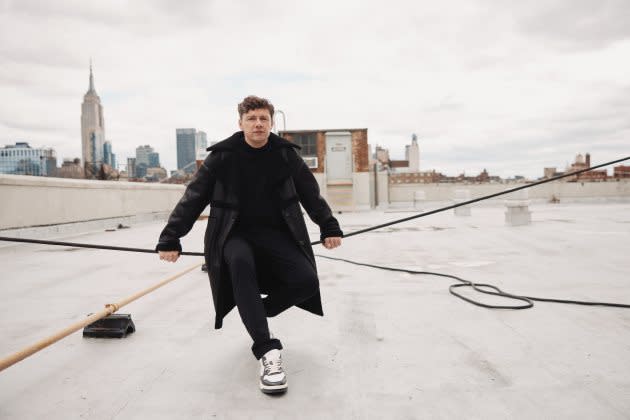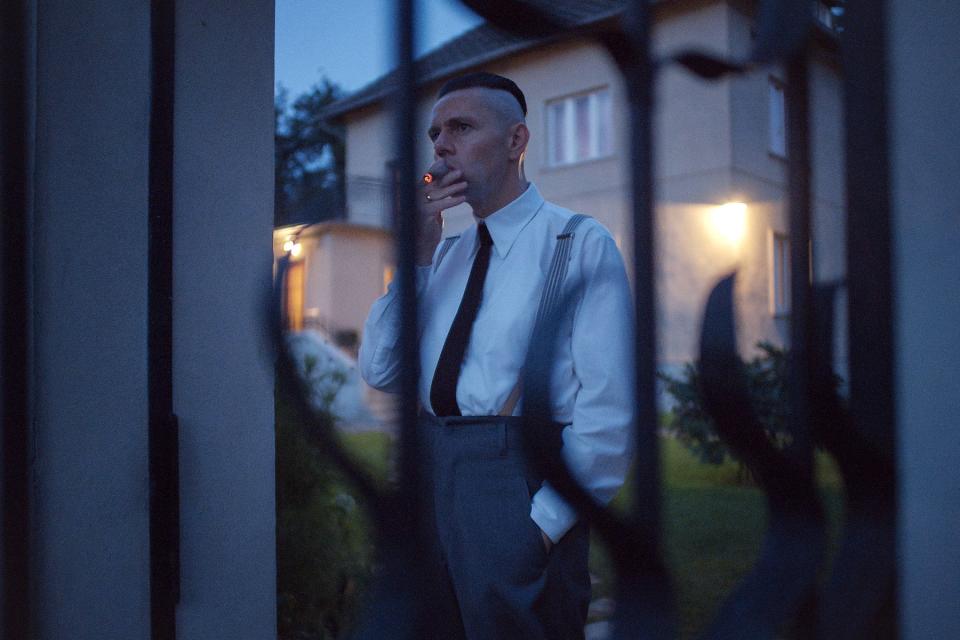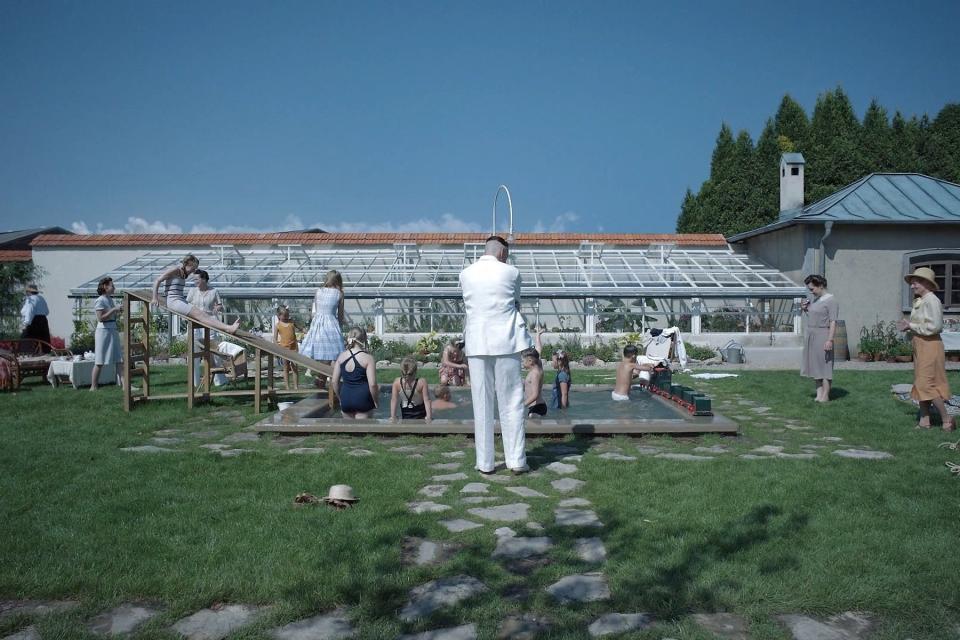He Gave the Most Chilling Performance of the Year as a Nazi
- Oops!Something went wrong.Please try again later.
- Oops!Something went wrong.Please try again later.
- Oops!Something went wrong.Please try again later.
- Oops!Something went wrong.Please try again later.

Christian Friedel was overcome with shame. Days before playing Rudolf Höss, the commandant of Auschwitz concentration camp, in Jonathan Glazer’s film The Zone of Interest, the German actor chose to visit Auschwitz for the first time. And since he’d already been given an undercut, Friedel had to tuck his Nazi hairdo underneath a baseball cap whilst touring the site where his character oversaw the extermination of 1.1 million Jews.
“I was ashamed with this haircut,” Friedel tells Rolling Stone. “It was schizophrenic, in a way, because I was visiting the camp as a human being and was shocked. I had tears in my eyes. But I was also visiting the camp knowing I was playing the commandant, so I was thinking about what could be in his brain, and how it made him feel powerful and proud, like the King of Auschwitz.”
More from Rolling Stone
Substack Loses Major Newsletter Platformer Over Nazi Content
Substack to Remove Some Nazi Newsletters After Being Called Out
'The White Lotus' Confirms Season 3 Cast, Filming Begins Soon in Thailand
Securing the role of Höss wasn’t easy, either. Glazer first asked Friedel to submit a self-tape describing himself and why he became an actor. (There was no script at that point.) Friedel chose to do the tape in German — the only actor to do so — which piqued Glazer’s interest. Then, the two met at a pub in London, where the filmmaker shared his vision for the film and showed the actor a collection of rare photographs of the Höss family in their idyllic home right next to Auschwitz. Friedel characterizes it as “a really intense conversation” where Glazer assured him, “This is a movie for the victims, not to glorify any of these horrible people.” Finally, Friedel had a chemistry read in Berlin with Sandra Hüller, who’d been cast as Höss’ wife, Hedwig.
It certainly helped that Friedel, 44, had had years of practice. His first film role was as a schoolteacher sounding the alarm in The White Ribbon, Michael Haneke’s exploration of the seeds of fascism in pre-WWI Germany.
“I changed sides,” jokes Friedel, adding, “And there is a big connection between both films. The children of The White Ribbon could be the future perpetrators of The Zone of Interest.”
Friedel says he learned a great deal from watching Haneke direct The White Ribbon, and the filmmaker told him something that hasn’t left his mind since: he has a “historical face.”

He subsequently portrayed a Jewish character navigating Nazi Germany in 2013’s Closed Season, as well as Georg Elser, a German carpenter who attempted to assassinate Hitler, in 2015’s Thirteen Minutes.
“It’s in my contract that it needs to be a movie with Nazis,” Friedel offers, with a laugh, before getting serious about Höss: “I hate Rudolf Höss. I cannot say I understand his actions. But he was a human being, and all these characters were human beings, and I think it’s important to tell these stories.”
Production on The Zone of Interest was postponed for a year because of Covid, so the cast held weekly Zoom calls with Glazer discussing the characters the script, tweaking it occasionally. Friedel took the time to learn horseback riding, put on weight to embody the gluttonous cretin, consume every article he could find on Höss, and listen to his witness testimony at the Nuremberg trials. The film itself follows the Höss family as they go about their days in (and outside) their splendid home — tending to the lush garden, frolicking in the pool, telling bedtime stories — all as the shrieks, cries, and screams of mass murder echo beyond its walls. That we never see the carnage unfolding only amplifies the sense of dread. Rudolf and Hedwig’s apathy speaks volumes.
The set was located only 100 meters from Auschwitz concentration camp and the original Höss home in Oświęcim, Poland. Glazer’s team rebuilt the Höss home and garden from scratch, as well as the camp walls surrounding it. Behind those walls were green screens that were ultimately filled in with images of the camp’s looming towers.
“Shooting in the area was really emotional and intense,” says Friedel. “It was important to know what the movie was for, and to keep that in our minds.”
While The Zone of Interest is a formalist triumph — the icy pessimism of Kubrick, punctuated by an unnervingly strident electronic score from Mica Levi — Glazer’s modus operandi was more malleable. Similar to his 2013 film Under the Skin, wherein Scarlett Johansson’s alien seductress picked up real-life men on the streets of Glasgow as Glazer captured the interactions with hidden cameras (the men were later asked for permission to use the footage), the filmmaker had up to ten cameras situated all over the house shooting Friedel, Hüller, and co. in long, uninterrupted takes, as he observed the footage on monitors in a trailer outside. The focus puller was in the basement. Sometimes, the actors had no idea where the cameras or microphones were.
“I felt I needed to be more spontaneous,” says Friedel. “We had a multi-camera system where we were observed by sometimes ten cameras, alone in the house, without technical interruptions and Jonathan on the set. So, we had all the time in the world to find things. We were allowed to be boring, make mistakes, and create variations of situations. [Glazer] said, ‘It’s very important that you’re not acting. You are being in this house.’”
He adds, “The day before we shot specific scenes we had blocking — which room, how many rooms, if it’s only inside or also outside. That determined which angles would be great for the cameras. And the next day, we’d talk about the scene, and then start immediately. There were no crew members on the set. Sometimes, someone outside the set would yell, ‘Cut!’ and sometimes not. We’d have variations of scenes for an hour. And they were all one-shots. The first scene you see in the movie, of us by the water, we did variations of for one and a half hours. And after we’d cut, he’d sometimes say, ‘Surprise me.’ It felt real, in a way.”

There are a number of scenes in The Zone of Interest that have left their mark on Friedel. The only scene in the film that takes place inside the walls of Auschwitz sees the camera linger on the actor’s face, in close-up, as the clamor of death is heard all around him. Höss is sitting on a horse, lost in a haze of fog. By the end of it, Friedel’s face was covered with ash. And speaking of ash, one sequence I haven’t been able to shake concerns Höss and his children wading in the water only to realize that it’s filled with the ashes of dead Jews, prompting Höss to hurry his kids out of the polluted stream.
“We see the self-deception,” explains Friedel. “They are compartmentalized, and he forgets what he’s doing. He knows exactly what it is, but thinks he’s just going into nature. And then he has to protect his children. It’s a genius picture of Jonathan to show how far from reality he is sometimes.”
Friedel is currently in talks to play a very different role: Klaus Nomi, a gender-fluid German new wave artist who died of AIDS, for Austrian filmmaker Markus Schleinzer, who cast him in The White Ribbon. Friedel, who is a classically trained musician, hopes to sing all the synth-heavy numbers himself. And he is also checking in to The White Lotus for Season Three, set in Thailand. But for now, he wants audiences to heed the warning of The Zone of Interest.
“Fascism and antisemitism are growing again, and I’m afraid for what’s coming,” he says. “This movie reminds us what could happen if we decide to work for a brutal system. We have to be aware of this.”
Best of Rolling Stone

